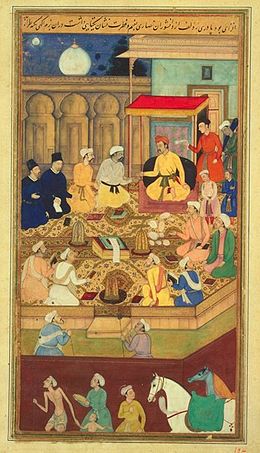
Ibadat Khana
Encyclopedia

Mughal Empire
The Mughal Empire , or Mogul Empire in traditional English usage, was an imperial power from the Indian Subcontinent. The Mughal emperors were descendants of the Timurids...
Emperor Akbar (r. 1556-1605) at his palace in Fatehpur Sikri
Fatehpur Sikri
Fatehpur Sikri is a city and a municipal board in Agra district in the state of Uttar Pradesh, India. Built near the much older Sikri, the historical city of Fatehabad, as it was first named, was constructed by Mughal emperor Akbar beginning in 1570...
to gather religious leaders of many faiths in discussion.
Akbar built the Ibādat Khāna originally as a debating house open only to Sunni Muslims, but following a series of petty squabbles which turned ugly, Akbar encouraged Hindu
Hindu
Hindu refers to an identity associated with the philosophical, religious and cultural systems that are indigenous to the Indian subcontinent. As used in the Constitution of India, the word "Hindu" is also attributed to all persons professing any Indian religion...
s, Roman Catholics and even atheists
Carvaka
' , also known as ', is a system of Indian philosophy that assumes various forms of philosophical skepticism and religious indifference. It seems named after , the probable author of the and probably a follower of Brihaspati, who founded the ' philosophy.In overviews of Indian philosophy, Cārvāka...
to participate. Religious leaders and philosophers from around this diverse empire, as well as those passing through, were invited to Akbar's Thursday evening discussions.
By the late 1580s CE, Akbar began an attempt to reconcile the differences of all religions by creating a new faith, the Din-i-Ilahi
Din-i-Ilahi
The Dīn-i Ilāhī was a syncretic religious doctrine propounded by the Mughal emperor Jalālu d-Dīn Muḥammad Akbar , who ruled the Indian subcontinent from 1556 to 1605, intending to merge the best elements of the religions of his empire, and thereby reconcile the differences that divided his subjects...
("Faith of the Divine"), which incorporated both pantheistic
Pantheism
Pantheism is the view that the Universe and God are identical. Pantheists thus do not believe in a personal, anthropomorphic or creator god. The word derives from the Greek meaning "all" and the Greek meaning "God". As such, Pantheism denotes the idea that "God" is best seen as a process of...
versions of Islamic Sufism
Sufism
Sufism or ' is defined by its adherents as the inner, mystical dimension of Islam. A practitioner of this tradition is generally known as a '...
(most notably Ibn Arabi
Ibn Arabi
Ibn ʿArabī was an Andalusian Moorish Sufi mystic and philosopher. His full name was Abū 'Abdillāh Muḥammad ibn 'Alī ibn Muḥammad ibn `Arabī .-Biography:...
's doctrine of Wahdat al wajood or Unity of Existence) and bhakti
Bhakti
In Hinduism Bhakti is religious devotion in the form of active involvement of a devotee in worship of the divine.Within monotheistic Hinduism, it is the love felt by the worshipper towards the personal God, a concept expressed in Hindu theology as Svayam Bhagavan.Bhakti can be used of either...
or devotional cults of Hinduism. Even some elements of Christianity
Christianity
Christianity is a monotheistic religion based on the life and teachings of Jesus as presented in canonical gospels and other New Testament writings...
(like crosses), Zoroastrianism
Zoroastrianism
Zoroastrianism is a religion and philosophy based on the teachings of prophet Zoroaster and was formerly among the world's largest religions. It was probably founded some time before the 6th century BCE in Greater Iran.In Zoroastrianism, the Creator Ahura Mazda is all good, and no evil...
(fire ceremonies) and Jainism
Jainism
Jainism is an Indian religion that prescribes a path of non-violence towards all living beings. Its philosophy and practice emphasize the necessity of self-effort to move the soul towards divine consciousness and liberation. Any soul that has conquered its own inner enemies and achieved the state...
were amalgamated in the new religion. Akbar was greatly influenced by the teachings of Jain Acharya
Acharya
In Indian religions and society, an acharya is a guide or instructor in religious matters; founder, or leader of a sect; or a highly learned man or a title affixed to the names of learned men...
s Hir Vijay Suri and Jin Chandra Suri and gave up non-vegetarian food because of their influence. He declared Amari or non-killing of animals on the holy days of Jains like Paryushan and Mahavir Jayanti
Mahavir Jayanti
In Jainism, Mahavir Janma Kalyanak is the most important religious holiday. It celebrates the birth of Mahavira, the last Tirthankara. On the Gregorian calendar, the holiday occurs either in March or April....
. He rolled back the Jizya
Jizya
Under Islamic law, jizya or jizyah is a per capita tax levied on a section of an Islamic state's non-Muslim citizens, who meet certain criteria...
tax from Jain pilgrimage places like Palitana.
This faith, however, was not for the masses. In fact, the only "converts" to this new religion were the upper nobility of Akbar's court. Historians have so far been able to identify only 18 members of this new religion.
The exact site of the Ibadat Khana within the palace complex is unknown and has likely been long demolished. There is conjecture that the ornate single storey Diwan-I-Khas was the Ibadat Khana's original site.
Alfred Tennyson's poem Akbar’s Dream lauds the Ibādat Khāna, ascribing tolerance and humanity to his "Divine Faith", while implicitly criticising the intolerance of 19th century British Christianity.
Further reading
- Akbar's "House of Worship", or 'Ibadat-Khana. Vincent A. Smith, Journal of the Royal Asiatic Society for 1927, pages 715-722.

